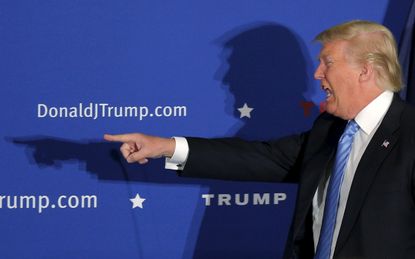When Republicans turn identity politics on themselves
On the deeper meaning of Donald Trump vs. Ted Cruz


There are few older traditions in American politics than one politician pointing to another and saying, "He's not one of us."
The target of the insult may be suspiciously alien because of his race or religion, or how deep his roots go in the community, or whether he partakes of leisure activities common among that particular electorate. Or it may just be something in his "values," some weird ideas he picked up from elsewhere.
It's often Republicans who make that argument about Democrats, but today they are also deeply invested in the idea that Democrats are the only ones who play identity politics. It's those liberals who are always thinking about race and gender, who want to be "politically correct" and not offend anybody of any particular group, who want to divide us all according to who we are instead of bringing us all together.
Subscribe to The Week
Escape your echo chamber. Get the facts behind the news, plus analysis from multiple perspectives.

Sign up for The Week's Free Newsletters
From our morning news briefing to a weekly Good News Newsletter, get the best of The Week delivered directly to your inbox.
From our morning news briefing to a weekly Good News Newsletter, get the best of The Week delivered directly to your inbox.
The truth is that both sides do it, just in different ways. And one of the things that characterized the Republican version of identity politics is that the finger of accusation is usually pointed leftward, at Democrats. There's a simple reason for that: Republicans are a much less diverse party, so the Other is usually going to be someone over there. When it comes to presidential politics, despite the occasional Alan Keyes, Liddy Dole, or Herman Cain, there's usually nobody but white guys running.
But in this year's primary campaign, we have one woman, one African American, and two Hispanics, and both of the latter stand a real chance of becoming the party's nominee. So now Donald Trump, who already ran an unsuccessful effort to prove that Barack Obama is a foreigner, has turned the spear of white identity politics on a fellow Republican, Ted Cruz. Trump is having a field day with the fact that Cruz was born in Canada, exhorting crowds to shout that Cruz isn't a citizen ("Honestly we don't know. Who the hell knows" if he is, Trump says) and playing "Born in the U.S.A." at his rallies. If you think this is about anything other than Cruz's last name, you haven't been paying enough attention to Trump's nativist campaign.
Constitutional scholars are in agreement that Cruz qualifies as a "natural born citizen" since the fact that his mother is American made him an American citizen at birth. But that hasn't stopped Trump from bringing the issue up at every opportunity, saying that at worst Cruz is not an American citizen, and at best it would be a problem for him in a general election because the Democrats would sue him over it. Trump understands the potential for such a suit, because "I know a lot. I'm like a Ph.D. in litigation."
This has already been an issue longer for than it has any right to, which is a tribute to Trump's ability to set the news agenda. Like much of what Trump says, one's first reaction is, "Wait — is he serious?" And then it takes a while to figure out whether this latest ridiculous thing is actually going to work for him. So far, it doesn't appear so — Cruz is still climbing in the polls and seems unaffected — but it still highlights how central notions of group identity are in American politics in general and Republican politics in particular.
The difference now is that identity is a contested sphere within the Republican Party, and the question isn't so much what different people of different identities should want or receive or believe, but who gets to belong and who doesn't.
At a time when immigration politics continue to divide the GOP's elite from its base — with the elite wanting desperately to reach out to Hispanic voters so the party can stand a chance of winning the White House, and the base angry about the presence of immigrants in their communities — one might have expected Marco Rubio to be the one Trump would single out as alien. Unlike Cruz, Rubio speaks fluent Spanish and has made his parent's immigration story central to the biography he presents as the foundation of his candidacy. The difference is simply their place in the polls: If Rubio was the one leading in Iowa and in second place nationally, he'd be the target of Trump's attack.
Were that the case, it might make for a deeper discussion about how different groups within the GOP really feel about Hispanics. Throughout the Obama years, the party has been enacting a ritual of white grievance — tune into Fox News for a day or two and you'll hear any number of diatribes about how white men are the real oppressed class in America. Yet at the same time, the party's representatives insist that unlike Democrats, they don't want to divide people by their identities.
In the end, this is a party that still can't decide what it wants to be. Is it inclusive and welcoming, where anyone who shares its philosophy can find a home, regardless of what they look like or what their name is? Or is an almost exclusively white party unable to tolerate the idea that a certain kind of person might be its standard-bearer?
Just because Donald Trump decides to attack one of his opponents as foreign doesn't mean that the party has made its decision. But right now, his brand of politics is winning.
Sign up for Today's Best Articles in your inbox
A free daily email with the biggest news stories of the day – and the best features from TheWeek.com
Paul Waldman is a senior writer with The American Prospect magazine and a blogger for The Washington Post. His writing has appeared in dozens of newspapers, magazines, and web sites, and he is the author or co-author of four books on media and politics.
-
 4 ways to give back this holiday season
4 ways to give back this holiday seasonThe Explainer If your budget is feeling squeezed, remember that money is not the only way you can be generous around the holidays
By Becca Stanek, The Week US Published
-
 4 tips for hosting an ecofriendly Thanksgiving
4 tips for hosting an ecofriendly ThanksgivingThe Week Recommends Coming together for the holidays typically produces a ton of waste, but with proper preparation, you can have an environmentally friendly gathering.
By Theara Coleman, The Week US Published
-
 Jussie Smollet conviction overturned on appeal
Jussie Smollet conviction overturned on appealSpeed Read The Illinois Supreme Court overturned the actor's conviction on charges of staging a racist and homophobic attack against himself in 2019
By Peter Weber, The Week US Published
-
 US election: who the billionaires are backing
US election: who the billionaires are backingThe Explainer More have endorsed Kamala Harris than Donald Trump, but among the 'ultra-rich' the split is more even
By Harriet Marsden, The Week UK Published
-
 US election: where things stand with one week to go
US election: where things stand with one week to goThe Explainer Harris' lead in the polls has been narrowing in Trump's favour, but her campaign remains 'cautiously optimistic'
By Harriet Marsden, The Week UK Published
-
 Is Trump okay?
Is Trump okay?Today's Big Question Former president's mental fitness and alleged cognitive decline firmly back in the spotlight after 'bizarre' town hall event
By Harriet Marsden, The Week UK Published
-
 The life and times of Kamala Harris
The life and times of Kamala HarrisThe Explainer The vice-president is narrowly leading the race to become the next US president. How did she get to where she is now?
By The Week UK Published
-
 Will 'weirdly civil' VP debate move dial in US election?
Will 'weirdly civil' VP debate move dial in US election?Today's Big Question 'Diametrically opposed' candidates showed 'a lot of commonality' on some issues, but offered competing visions for America's future and democracy
By Harriet Marsden, The Week UK Published
-
 1 of 6 'Trump Train' drivers liable in Biden bus blockade
1 of 6 'Trump Train' drivers liable in Biden bus blockadeSpeed Read Only one of the accused was found liable in the case concerning the deliberate slowing of a 2020 Biden campaign bus
By Peter Weber, The Week US Published
-
 How could J.D. Vance impact the special relationship?
How could J.D. Vance impact the special relationship?Today's Big Question Trump's hawkish pick for VP said UK is the first 'truly Islamist country' with a nuclear weapon
By Harriet Marsden, The Week UK Published
-
 Biden, Trump urge calm after assassination attempt
Biden, Trump urge calm after assassination attemptSpeed Reads A 20-year-old gunman grazed Trump's ear and fatally shot a rally attendee on Saturday
By Peter Weber, The Week US Published